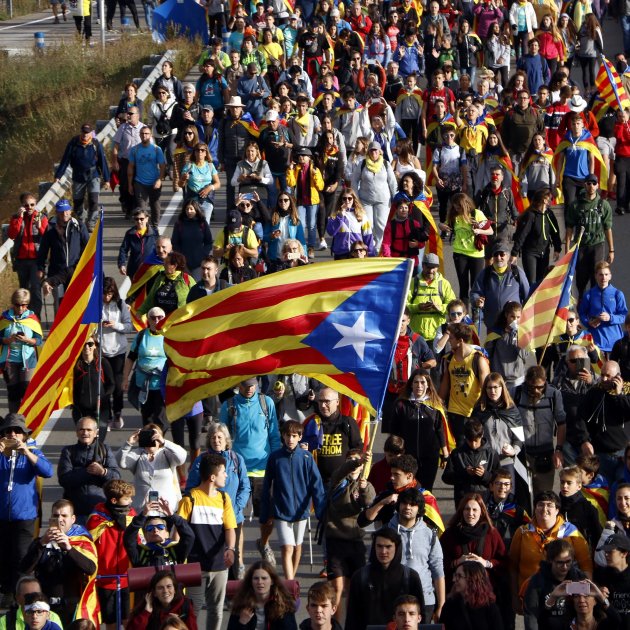Since early this Wednesday morning, five different 'Marches for Freedom' have been on the road in Catalonia. In response to the long prison sentences announced for nine pro-independence leaders, many thousands of people have set out from five different points in Catalonia on a three-day march on foot to Barcelona via Catalonia's main highways. The largest columns at present are those that started from the cities of Girona and Vic, each with around 10,000 on the highway. Two thousand people, according to the organizers, are currently marching eastwards along the A-2 motorway from Tàrrega and close to 4,000 are coming from Tarragona in the south. The column coming from Berga, in central Catalonia, is currently about a thousand strong.
The first column to set out was that from town of Tàrrega, in Lleída province, who hit the road at 7am, and by nine o'clock all five groups were on the highway. They have before them a march of around 100 kilometres (60 mile) in all cases, and will arrive in the Catalan capital on Friday.
The five converging marches are an initiative in response to the Supreme Court verdicts by the two major pro-independence civil groups, the Catalan National Assembly (ANC) and Òmnium Cultural. The leaders of the two organizations are on the march themselves, with the ANC's Elisenda Paluzie in the Girona column, while Òmnium's Marcel Mauri has started in Tarragona.
Girona
Follow the live video showing the progress of the "March for Freedom" column that set out from the northern city of Girona:
In Girona, about 7,000 people gathered at eight in the city's Plaça de l'1 Octubre, had breakfast together and were on the road just after 9am. At the head of the march were relatives of the imprisoned government minister Dolors Bassa and the exiled president Carles Puigdemont, as well as the ANC president Elisenda Paluzié. Accompanying the marchers with their backpacks and estelada flags, there are also tractors on the move. The group is setting a good pace, and growing in size as it goes - reaching a total of around 10,000 by the time it passed through the town of Salt. At 1pm the column was already heading south on the main AP-7 motorway.
Tarragona
At Tarragona, the march set out along the coast towards Torredembarra at 7.30am. The Tarragona mayor, Pau Ricomà, the Catalan government minister for territory and sustainability, Damià Calvet and the JxCat politician Ferran Bel are taking part, along with around 3,000 others as the march set out.
Vic
Hundreds of people gathered in the Plaça de l'1 Octubre in Vic at 7.30am ready for their three-day walk, many carrying backpacks and sleeping mats ready to spend the night outside. Close to 9am they set out with about twenty tractors at the head of the group, along the C-17 highway. Family members of the Catalan prisoners and exiles who joined the group included the partners of prisoners Jordi Turull and Quim Forn, and the sister of the exiled Toni Comín. Also walking in the column from Vic is Marta Torrecillas, one of those who was injured by police on 1st October, 2017.
Berga
In Berga, about a thousand people met at 8am in the town's Plaça Guernika and took the C-66 highway towards Gironella. The protesters are carrying banners calling for the release of the prisoners and and independence for Catalonia, and include people of all ages, even a woman in a wheelchair. This march includes many residents of central and northern parts of Catalonia, such as the counties of Berguedà, Solsonès and Cerdanya.
Tàrrega
In Tàrrega, in the west of Catalonia, the demonstrators have cut three lanes of the A-2 motorway, in the direction of Barcelona. This march has made the most progress, having started at 7am. Again, the group includes people of all ages with backpacks and estelada flags.
Effects on traffic on main Catalan highways
There were six highways affected at Wednesday lunchtime by the Marches for Freedom:
- Main north-south motorway AP-7 at Aiguaviva
- A-2 at Riudellots de la Selva (cut in both directions)
- C-16 at Puig-reig
- C-17 at Hostalets de Balenyà
- A-2 at Cervera
- N-340 at Creixell
The real-time traffic situation can be consulted here (information in Catalan).
Objective: to arrive in Barcelona during the general strike
The different columns will converge on Friday afternoon in Barcelona, where they aim to join the demonstration convened by the Intersindical trade union at 5:00 p.m. as part of the one-day general strike in protest at the court verdicts. Traffic circulation that day in the Catalan capital is expected to be very difficult, since protesters will block several major traffic arteries in the city: Diagonal, Gran Via and Meridiana.
The March for Freedom organizers have prepared several supply points along the route so that participants receive three meals a day, and there are also places to sleep in different municipalities, which can be booked through the website created for the occasion.
